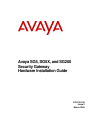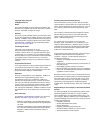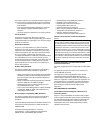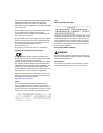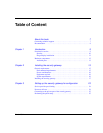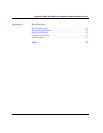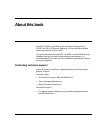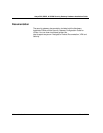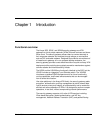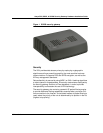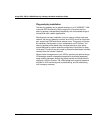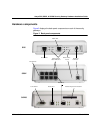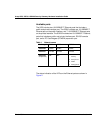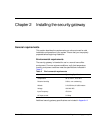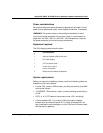Copyright 2004, Avaya Inc.
All Rights Reserved
Notice
Every effort was made to ensure that the information in this
document was complete and accurate at the time of release.
However, information is subject to change.
Warranty
Avaya Inc. provides a limited warranty on this product. Refer
to your sales agreement to establish the terms of the limited
warranty. In addition, Avaya’s standard warranty language as
well as information regarding support for this product, while
under warranty, is available through the following website:
http://www.avaya.com/support
Preventing Toll Fraud
“Toll fraud” is the unauthorized use of your
telecommunications system by an unauthorized party (for
example, a person who is not a corporate employee, agent,
subcontractor, or is not working on your company's behalf).
Be aware that there may be a risk of toll fraud associated with
your system and that, if toll fraud occurs, it can result in
substantial additional charges for your telecommunications
services.
Avaya Fraud Intervention
If you suspect that you are being victimized by toll fraud and
you need technical assistance or support, in the United
States and Canada, call the Technical Service Center's Toll
Fraud Intervention Hotline at 1-800-643-2353.
Disclaimer
Avaya is not responsible for any modifications, additions or
deletions to the original published version of this
documentation unless such modifications, additions or
deletions were performed by Avaya. Customer and/or End
User agree to indemnify and hold harmless Avaya. Avaya’s
agents, servants and employees against all claims, lawsuits,
demands and judgements arising out of, or in connection
with, subsequent modifications, additions or deletions to this
documentation to the extent made by the Customer or End
User.
How to Get Help
For additional support telephone numbers, go to the Avaya
Web site: http://www.avaya.com/support/. If you are:
• Within the United States, click Escalation Management
link. Then click the appropriate link for the type of support
you need.
• Outside the United States, click Escalation Management
link. Then click International Services link that includes
telephone numbers for the International Centers of
Excellence.
Providing Telecommunications Security
Telecommunications security (of voice, data, and/or video
communications) is the prevention of any type of intrusion to
(that is, either unauthorized or malicious access to or use of)
your company's telecommunications equipment by some
party.
Your company's “telecommunications equipment” includes
both this Avaya product and any other voice/data/video
equipment that could be accessed via this Avaya product
(that is, “networked equipment”).
An “outside party” is anyone who is not a corporate
employee, agent, subcontractor, or is not working on your
company's behalf. Whereas, a “malicious party” is anyone
(including someone who may be otherwise authorized) who
accesses your telecommunications equipment with either
malicious or mischievous intent.
Such intrusions may be either to/through synchronous (time-
multiplexed and/or circuit-based) or asynchronous
(character-, message-, or packet-based) equipment or
interfaces for reasons of:
• Utilization (of capabilities special to the accessed
equipment)
• Theft (such as, of intellectual property, financial assets, or
toll-facility access)
• Eavesdropping (privacy invasions to humans)
• Mischief (troubling, but apparently innocuous, tampering)
• Harm (such as harmful tampering, data loss or alteration,
regardless of motive or intent)
Be aware that there may be a risk of unauthorized intrusions
associated with your system and/or its networked equipment.
Also realize that, if such an intrusion should occur, it could
result in a variety of losses to your company (including but
not limited to, human/data privacy, intellectual property,
material assets, financial resources, labor costs, and/or legal
costs).
Responsibility for Your Company’s Telecommunications
Security
The final responsibility for securing both this system and its
networked equipment rests with you - Avaya’s customer
system administrator, your telecommunications peers, and
your managers. Base the fulfillment of your responsibility on
acquired knowledge and resources from a variety of sources
including but not limited to:
• Installation documents
• System administration documents
• Security documents
• Hardware-/software-based security tools
• Shared information between you and your peers
• Telecommunications security experts



